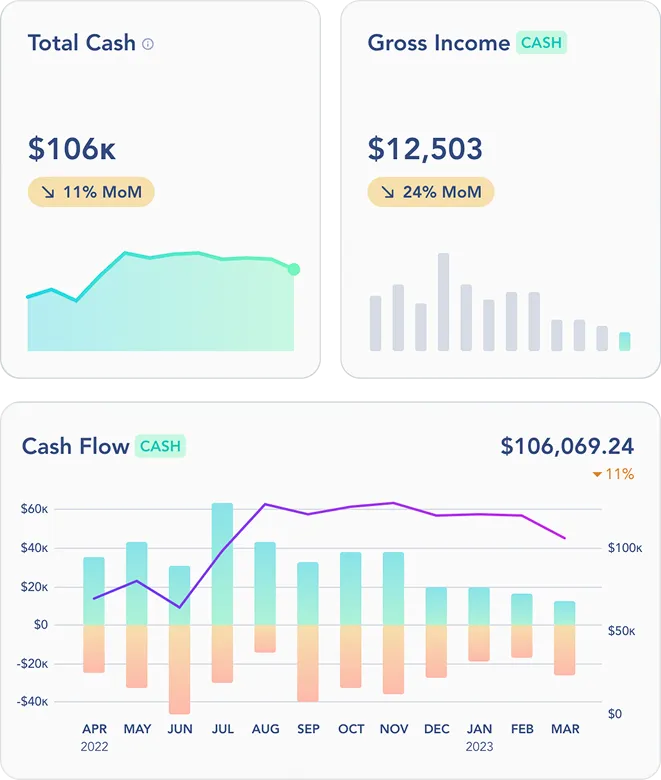
When to Hire an Accountant for Your Small Business or Startup
 Team Digits
Team Digits
When it comes to your company's finances, there's a point where DIY just doesn't cut it anymore. So, when is the right time to bring in the accounting experts?
Let's face it: Managing the financial side of your business can feel like navigating a maze blindfolded. Whether you're just starting out or your startup is hitting its growth stride, the question of when to hire an accountant isn't just about crunching numbers — it's about setting your business up for long-term success.
In this article, we'll walk through the telltale signs that it's time to level up your financial game, explore the advantages of getting professional accounting help, and break down your options — from full-time hires to modern AI accounting solutions.
Signs you might need an accountant
Let's be real: There's no flashing neon sign that says, "Hire an accountant NOW!" But there are some pretty clear indicators of when to hire a certified public accountant (CPA) or accounting expert.
Hiring an accountant frees you up to focus on what you do best: growing your company and bringing your vision to life. Here are the top signs that your business could use some professional financial support.
You're just starting a business
Paradoxically, the beginning is one of the best times to hire an accountant. One of the first big decisions you'll make is choosing your business structure: LLC, S-Corp, or C-Corp. Each has its own implications for taxes and liability, and an accountant can help you understand the pros and cons of each.
Setting up your financial systems right from the start can save you countless headaches down the road. An accountant can help you establish solid bookkeeping practices, choose the right accounting software, and set up processes that will scale with your business.
Budgeting and forecasting will help you create realistic financial projections to guide your growth. An accountant can help you understand your cash flow, set pricing strategies, and make informed decisions about when to invest in expansion.
You're growing fast
Congratulations, your startup is taking off! But with great growth comes more financial complexity. When your employee base is expanding, sales are increasing, or you're rolling out new products or services, an accountant can ensure that your financial management scales in tandem with your business.
Growing often means expanding into new markets, whether that's different states or countries. An accountant can help you navigate the specific tax rules and regulations of each territory.
An accountant can also help you present your business in the best light when you’re fundraising. After all, investors love solid financials.
Tax time is overwhelming
One of the most prominent indicators that you need an accountant is when you’re spending all of your time from February to April on taxes and lose sight of business goals. Properly filing taxes requires understanding business tax laws and regulations — and tax laws change faster than startup trends.
Accountants stay updated on these changes, know the deductions and credits you might be missing out on, and can help maximize your returns while minimizing your liabilities. The time, stress, and potential mistakes saved by hiring an accountant usually outweigh the cost.
Mistakes are being made
Bounced checks or frequent overdraft fees are signs that your cash flow management needs work. An accountant can help you make sure you always have enough to cover your expenses.
If you're racking up late fees or penalties, an accountant can help you stay on top of deadlines and obligations, whether that's paying vendors, submitting tax return forms, or meeting loan payments.
Discrepancies in your books are another major red flag. If things aren't adding up, or if you're struggling to reconcile your accounts, an accountant can dig into your finances, identify the source of any discrepancies, and help you correct them.
The advantages of getting help from an accountant
Whether you're just starting out or scaling up, the right accountant can be a powerful ally in your journey to business success.
Time is money, and accountants save you both
According to a 2023 survey by the National Association of Small Businesses, around 25% of small business owners spend an average of 120 hours per year dealing with tax-related tasks.
As a founder or business owner, your time is precious. Every hour you spend puzzling over expense categories or deciphering tax forms is an hour you're not spending on growing your business. An accountant takes these tasks off your plate, freeing you up to code the next big app or perfect your pitch to investors.
But it's not just about saving time. A good accountant can actually save you money in ways you might not expect by trimming expenses, maximizing deductions, and improving your cash flow.
Navigating the regulatory maze
The world of business regulations is about as clear as mud. And it's constantly changing. An accountant is your guide on the latest changes in tax laws, reporting requirements, and industry-specific regulations, so you don't have to keep track of everything.
This expertise is invaluable when it comes to compliance. Mistakes in this area can lead to costly penalties or even legal issues. With an accountant on your side, you can rest easy knowing your business is playing by the rules — even when the rulebook keeps changing.
Strategic financial planning
Accountants help you plan for the future and make strategic business decisions. For example, if you want to know if you can afford to hire that rockstar developer or upgrade your office space, a good accountant can provide the financial insights you need to make these decisions with confidence.
According to a survey by OnPay, 86% of small business owners trust their accountants, and would reach out to them for business advice more often than working with an external advisor, such as lawyers or friends. Accountants can help you create budgets that you can actually stick to, forecast your cash flow, and build financial strategies that support your business goals.
Credibility boost
Whether you're applying for a loan, seeking investors, or negotiating with suppliers, professionally prepared financial statements can give you a credibility boost.
An accountant can help you present your financial information in a clear, professional manner and speak the language of banks and investors. In the startup world, where competition for funding is fierce, this can be a game-changer.
Peace of mind
Last but definitely not least, working with an accountant can give you something priceless: peace of mind. No more lying awake at night wondering if you've made a mistake on your taxes that the IRS will find or second-guessing every financial decision. With an accountant in your corner, you can be confident that your financial bases are covered.
Picking the right accounting service for you
Now that you've decided you need accounting help, the next step is choosing the right type of service. Your options include hiring a full-time accountant, bringing in part-time help, or using AI accounting software. Let's break down the options so you can find the right fit for your business.
Hire full-time: the in-house expert
A full-time accountant is dedicated to your business and available when you need them. This option is ideal if your financial needs are complex and constantly evolving. Businesses dealing with multiple revenue streams, intricate tax situations, or rapid growth can benefit significantly from having a full-time accountant.
For example, consider a tech startup that began with a single SaaS product but quickly expanded to offer enterprise solutions, consulting services, and hardware sales across multiple countries. This company would benefit from a full-time accountant to manage the complexities of multi-stream revenue recognition, navigate international tax requirements, and provide real-time financial insights.
The advantages include having someone who thoroughly understands your business, is available for immediate consultations, and can quickly adapt to changes in your company. As your business grows, they can also take on additional financial roles, such as CFO duties.
However, it's important to consider the full costs associated with a full-time employee, including salary, benefits, and office space. This option is typically best for larger small businesses or well-funded startups that require constant financial attention.
Part-time help: the flexible solution
If you need regular professional financial support but don't want to hire full-time support, a part-time accountant could be the solution.
This approach provides consistent financial expertise without the investment of a full-time employee. You can bring in a part-time accountant for a set number of hours each week or month based on your specific needs.
It's an excellent choice if you require ongoing help with bookkeeping, regular financial reporting, or tax planning but don't have the workload or budget for a full-time position.
The flexibility is a key advantage. You can increase their hours during busy periods, such as tax season, and reduce them when things are quieter. You still benefit from someone who becomes familiar with your business over time.
AI accounting software: the tech-savvy choice
AI-powered accounting solutions automate many traditional accounting tasks, including expense categorization, account reconciliation, and financial report generation. Some advanced systems even offer real-time financial insights and forecasting.
Companies benefit from its speed, accuracy, and constant availability. AI systems can process data continuously without fatigue or errors. Many of these solutions are also more cost-effective than hiring a human accountant, so they're attractive for budget-conscious startups.
However, it's important to view AI accounting as a complement to human expertise rather than a replacement. While AI can handle routine tasks efficiently, people still play a crucial role in strategic financial planning and decision-making.
The hybrid approach: combining options with Digits
You don’t have to choose between technology and human expertise. Many successful businesses use a combination of approaches.
For instance, you might employ AI accounting software for daily bookkeeping and basic reporting, engage a part-time accountant for monthly reviews and tax planning, and consult with a financial advisor for strategic guidance.
This hybrid approach allows you to scale your financial support as your business grows, providing the right level of expertise when you need it.
Get accounting built for your business
Your accounting solution needs to keep up with your growth while providing insights to make informed decisions. This is where modern AI-powered accounting platforms that combine technology with human expertise can make a real difference.
Digits automates routine tasks, provides real-time financial insights, and scales as your business grows. Custom interactive dashboards allow you to keep a pulse on your business' financial health and share it with investors. While AI handles the heavy lifting of day-to-day accounting tasks, Digits has a team of expert in-house expert accountants to give you the strategic guidance and expertise you need.
Whether you're a startup founder looking to scale rapidly or a small business owner aiming for steady growth, having the right financial support can make all the difference.
Ready to take the next step? Schedule a demo to learn more about how Digits can provide accounting built specifically for your business needs.


